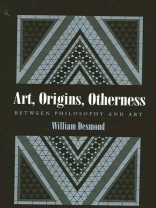Addresses the end of art and the task of metaphysics.
Though our time is often said to be post-religious and post-metaphysical, many continue to seek some encounter with otherness and transcendence in art. This book deals diversely with the issues of art, origins, and otherness, both in themselves and in philosophical engagements with the works of Plato, Kant, Hegel, Schopenhauer, Nietzsche, and Heidegger. Addressing themes such as eros and mania, genius and the sublime, transcendence and the saving power of art, William Desmond tries to make sense of the paradox that too much has been asked of art that now almost nothing is asked of it. He argues that there is more to be said philosophically of art, and claims that art has the power to open up mindfulness beyond objectifying knowledge, as well as beyond thinking that claims to be entirely self-determining.
Mục lục
Preface
Introduction
1. Mimesis, Eros, and Mania: On Platonic Originals
2. The Terror of Genius and the Otherness of the Sublime: On Kant and the Transcendental Origin
3. The Otherness of Art’s Enigma—Resolved or Dissolved? Hegel and the Dialectical Origin
4. Gothic Hegel: On Architecture and the Finer Enchantments of Transcendence
5. Art’s Release and the Sabbath of the Will: Schopenhauer and the Eros Turannos of Origin
6. Eros Frenzied and the Redemption of Art: Nietzsche and the Dionysian Origin
7. Art and the Self-Concealing Origin: Heidegger’s Equivocity and the Still Unthought Between
8. Art and the Impossible Burden of Transcendence: On the End of Art and the Task of Metaphysics
Index
Giới thiệu về tác giả
William Desmond is Professor of Philosophy and Director of the International Program in Philosophy, Institute of Philosophy, at Katholieke Universiteit Leuven, Belgium. He is the author of many books, including the award-winning Being and the Between; Ethics and the Between; and coeditor (with Joseph Grange) of Being and Dialectic: Metaphysics as a Cultural Presence; all published by SUNY Press.












